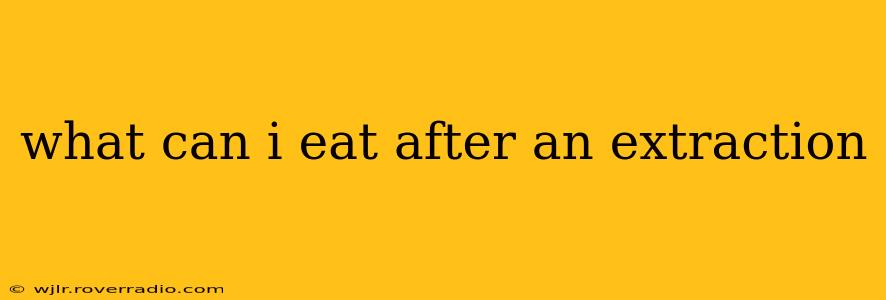What Can I Eat After an Extraction? A Guide to Post-Extraction Nutrition
Having a tooth extracted can be a bit unsettling, and knowing what to eat afterward is a crucial part of the healing process. The right foods can promote comfort, minimize pain, and support healthy recovery. This guide will walk you through the best and worst foods to consume after an extraction, answering common questions along the way.
Understanding the Importance of Post-Extraction Diet
The area where your tooth was extracted is a delicate wound. Your diet plays a significant role in how quickly and comfortably this wound heals. Avoiding certain foods minimizes the risk of infection, dry socket (a painful complication), and other post-operative issues.
What to Eat After a Tooth Extraction (The Good Stuff):
Immediately following the procedure, your dentist will likely recommend a soft or liquid diet for the first 24-48 hours. This allows the blood clot to form properly, which is essential for healing. Here are some excellent choices:
- Smoothies: Blend fruits, vegetables, yogurt, and even protein powder for a nutritious and easy-to-consume meal. Be mindful of avoiding anything with seeds or chunks.
- Soups: Broth-based soups are ideal. Avoid soups with chunky vegetables or ingredients that might get lodged in the extraction site.
- Applesauce: A classic soft food choice that provides essential nutrients.
- Yogurt: Provides protein and probiotics, supporting your immune system.
- Pudding: A comforting and easy-to-eat option, especially in the initial stages of recovery.
- Mashed Potatoes: A soft and easily digestible carbohydrate source.
- Scrambled Eggs: High in protein, and easily mashed or blended for smoother consistency.
- Oatmeal: A good source of fiber, but make sure it's well-cooked and soft.
What Can I Drink After a Tooth Extraction?
Staying hydrated is crucial. Stick to:
- Water: The best choice for hydration.
- Herbal Teas (decaffeinated): Avoid anything too hot, which could dislodge the blood clot.
- Juices (strained): Avoid pulpy juices that could contain seeds or small pieces.
Foods to Avoid After Tooth Extraction (The No-Nos):
The following foods should be avoided for at least a week or until your dentist gives you the all-clear:
- Hard Foods: Anything that requires significant chewing, such as nuts, chips, hard candies, and popcorn. These could dislodge the blood clot or cause further irritation.
- Spicy Foods: These can irritate the sensitive extraction site.
- Acidic Foods: Acidic foods and drinks like citrus fruits, tomatoes, and carbonated beverages can also irritate the wound.
- Foods with Small Seeds or Pieces: Seeds from berries, sesame seeds, or poppy seeds can easily get lodged in the extraction site, leading to infection or discomfort.
- Alcohol and Smoking: These can hinder healing and increase the risk of complications like dry socket.
What if I Develop Dry Socket?
Dry socket is a painful complication that can occur when the blood clot dislodges from the extraction site. Symptoms include severe pain, a bad taste in your mouth, and a visible empty socket. If you suspect you have dry socket, contact your dentist immediately. They can provide appropriate treatment.
When Can I Return to My Normal Diet?
Gradually reintroduce solid foods once the initial healing period (around a week) has passed and you no longer experience discomfort. Always listen to your body, and if a food causes pain, avoid it until the area heals further.
How Long Does it Take to Heal After a Tooth Extraction?
Healing time varies depending on the complexity of the extraction. Most individuals experience significant healing within a week or two, but full recovery can take several months. Regular follow-up appointments with your dentist are important to monitor the healing process.
By following these guidelines and paying attention to your body's signals, you can ensure a smooth and comfortable recovery after your tooth extraction. Remember, your dentist is the best resource for personalized advice and guidance. Always follow their instructions carefully.
